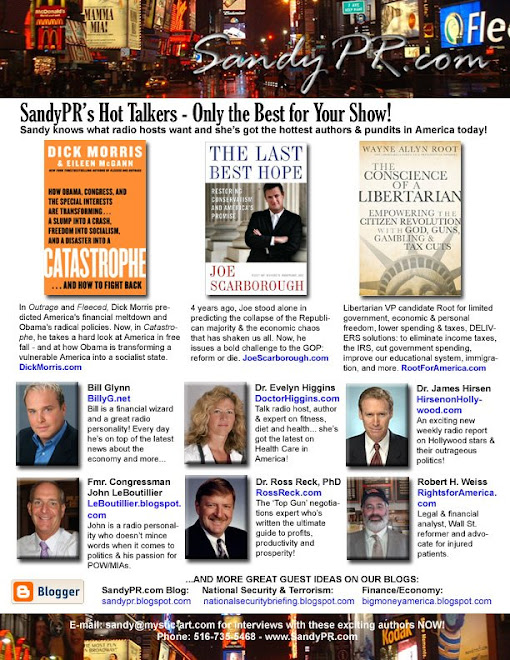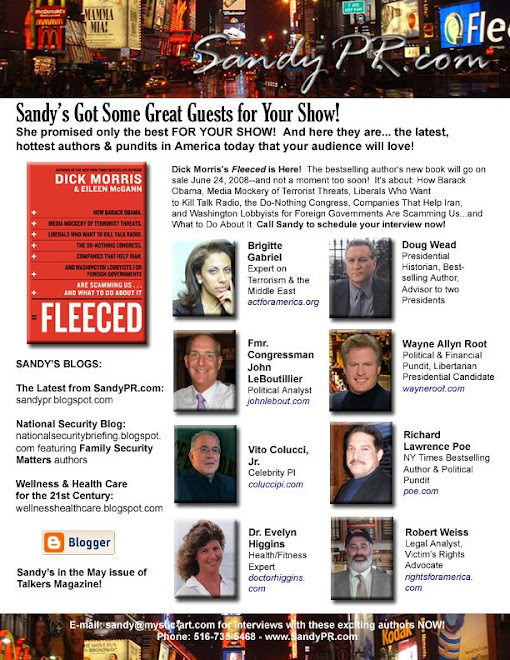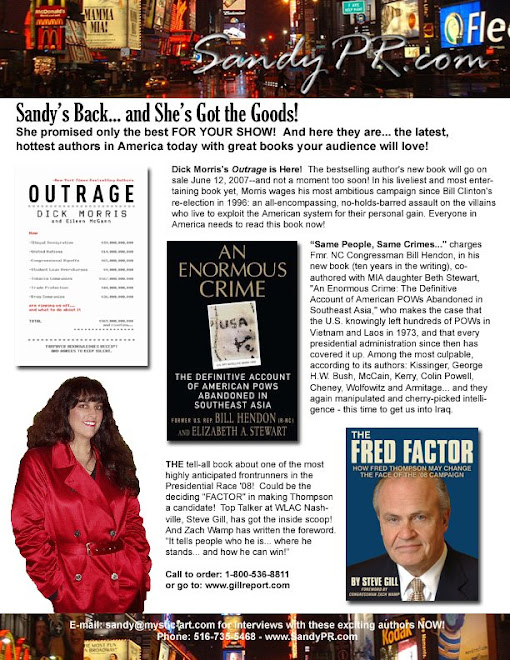
By Sandy Frazier
So you've decided to expand your career by becoming a pundit - an analyst, a commentator expounding on news stories in your chosen area of expertise. Talk radio hosts and producers will be very receptive to you if you stick by a few tried and true principles.
Always remember, you're marketing yourself as a BRAND - a trusted source of information. Listen to the guests who frequent talk radio - those who have become household names and have expanded their horizons to become world-renowned authors - famous for what they know. Watch them and learn from them.
Stay with what you know and use your experience, your assets and natural talents. For instance, if you're an expert on the economy and finance, don't suddenly decide to start blogging or write a book on theatre in the 21st century and expect it to go anywhere. Stick with what you do best!
Your Web Presence:
- The most important thing today in becoming successful at almost ANYTHING is to develop a great Web presence. Work on it. Do some research by 'Googling' your name and find out what's on the Web about you before you get started, so you can eliminate things you don't want out there and build an image that will take you where you want to go. If you've got several Web sites, consolidate them into one neat professional site.
- Buy your domain - preferably your name (i.e., http://www.sandyfrazier.com) and point all other Web sites to this main domain. List social networking pages on your main page. Make sure your domain has a blog that is easy for you to work with. If you've got a complicated name that's difficult to spell or pronounce, consider nicknames or alternative wording.
- Make sure you've got a clear and concise bio that is not too lengthy or complicated. Your "About" or "Bio" page should consist of your title, a few paragraphs highlighting your accomplishments, your education, books you've published, videos you've posted online (i.e., YouTube) and a great headshot. You can create a separate page if you've got media experience (radio/TV interviews, news clippings, etc.). NEVER include personal information about your spouse, your children or where you live and try not to go on about hobbies or avocations.
- Work on your image. Get yourself a great headshot (format: hi-res .jpg). You don't have to spend a fortune on professional pictures. Take a digital camera outside on a clear day and have a friend or family member shoot a number of photographs from which you can choose. Use common sense: make sure your teeth are white, your makeup clean, your clothes bright and neat.
- Social Networking - Use social networks, such as Twitter and Facebook, to your advantage by keeping your personal postings completely separate from your professional pages. Try to only post items that are relative to your professional goals, and will inspire your followers to seek out your expert advice, follow you online and on the radio.
Your Area of Expertise:
- Get in the habit of blogging at least once a week on your area of expertise. It'll help you discipline yourself to not only become a better writer, but to really hone in on ways to express yourself in your chosen field.
- Try to come up with a witty new angle on a topic or news story you're covering. As you do the research for your blog, try to use not only online sources, such as Google and Yahoo! but also print media, books, broadcast, TV reports, and especially life experience.
- Try not to be too eclectic in your choice of topics - stay on target and blog about what you know best and you'll be invited on talk radio and TV shows on a continuous basis, which will not only build your reputation, but will increase the value of your brand: YOU.
- In this day and age of self-publishing, everyone is an author, but few turn out quality work. If you decide to write a book, make sure you work HARD on it and do the research necessary to make it something really special - a book with a "hook" - timely information that will be sought after by talk radio and cable network TV producers. Don't assume because you're really knowledgeable about something, you need to write a book. If you choose the self-publishing route, make sure you're not turning out a pamphlet - write a COMPLETE BOOK before you go through all the work involved in trying to get it published or spending the money on self-publishing. And make sure you edit it well and even work with an editor if you can.
Preparing for Interviews:
- Once you've built your Web site and you're ready to go, you'll start getting offers to be a guest on talk radio. When you receive an invitation, the topic will be your current blog. Before the interview, make sure you're prepared and have some interesting facts/statistics ready to quote. You can even jot down some notes or some humorous or witty anecdotes you'd like to mention in the interview. That's the wonderful thing about phone interviews on talk radio - you can sit in front of your computer and Google as you go!
- Check the Web site of the radio show prior to the interview so you can familiarize yourself with the host and the show in general. Radio hosts are generally egomaniacs and they love it if you know who they are.
- Always plug your Web site (main domain) and if you're promoting a book, refer to the book several times throughout. You've decided to be a pundit so you will become a trusted source of information; so make sure your name gets out there and they know how to reach you online.
You'll be a great pundit if you're able to keep a clear head while you're on the air and no matter how argumentative the hosts or callers get, you've done your homework, you know your facts and you're confident! The 21st century is offering us all tremendous opportunities to get our names out there like never before! Take advantage of all the technology that is at your fingertips and you'll be a household name before you know it!
 By Sandy Frazier
So you've decided to expand your career by becoming a pundit - an analyst, a commentator expounding on news stories in your chosen area of expertise. Talk radio hosts and producers will be very receptive to you if you stick by a few tried and true principles.
Always remember, you're marketing yourself as a BRAND - a trusted source of information. Listen to the guests who frequent talk radio - those who have become household names and have expanded their horizons to become world-renowned authors - famous for what they know. Watch them and learn from them.
Stay with what you know and use your experience, your assets and natural talents. For instance, if you're an expert on the economy and finance, don't suddenly decide to start blogging or write a book on theatre in the 21st century and expect it to go anywhere. Stick with what you do best!
Your Web Presence:
By Sandy Frazier
So you've decided to expand your career by becoming a pundit - an analyst, a commentator expounding on news stories in your chosen area of expertise. Talk radio hosts and producers will be very receptive to you if you stick by a few tried and true principles.
Always remember, you're marketing yourself as a BRAND - a trusted source of information. Listen to the guests who frequent talk radio - those who have become household names and have expanded their horizons to become world-renowned authors - famous for what they know. Watch them and learn from them.
Stay with what you know and use your experience, your assets and natural talents. For instance, if you're an expert on the economy and finance, don't suddenly decide to start blogging or write a book on theatre in the 21st century and expect it to go anywhere. Stick with what you do best!
Your Web Presence:






1 comment:
Sounds like great advice from someone who obviously knows what she’s talking about.
Post a Comment